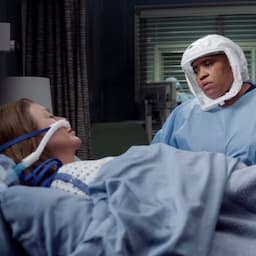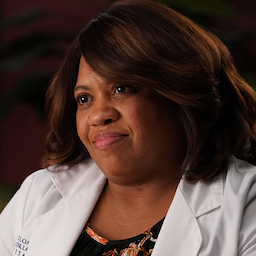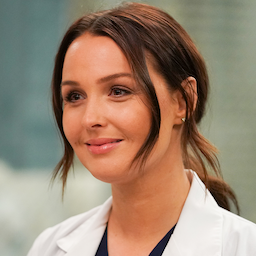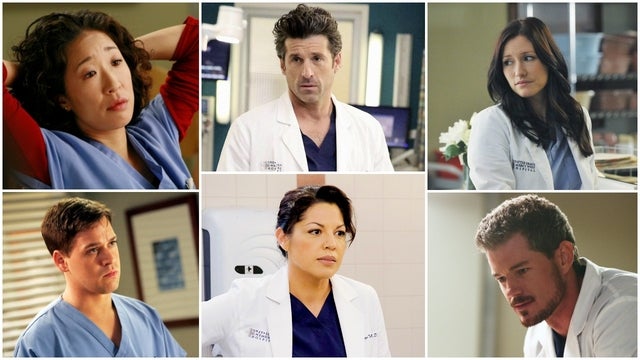Executive producers Andy Reaser and Meg Marinis talk to ET about Thursday's winter finale.
Spoiler alert! Do not proceed if you have not watched Thursday's winter finale of Grey's Anatomy.
Is Meredith Grey going to die?
Thursday's winter finale of Grey's Anatomy, the second hour of a two-part crossover with Station 19, ended with the beloved doctor in far worse shape than before. Still feeling the effects COVID-19, Meredith (Ellen Pompeo) appeared to be on the mend after waking up from being in and out of consciousness, during which she'd transport herself to the beachy dreamscape (the same place she reunited with Derek and George). But after seeing a COVID patient coding across the hall, Meredith went into hero mode and became the Meredith Grey viewers have been accustomed to seeing for nearly two decades, successfully reviving the patient without showing any worrisome signs.
Seconds later though, it became clear Meredith wasn't back on the mend. She was merely on a "COVID high." After taking a few steps toward her room, Meredith collapsed in the doorway of the patient's room, and as her friends revealed later, her lungs are shot and the only way for her to have a chance to live is to get on a ventilator, something Meredith was adamant against. But without the ventilator meant her chances of survival decreased exponentially. As her appointed medical proxy, Webber (James Pickens Jr.) made the painful and difficult decision to go against her wishes and give them the go-ahead. The episode ends with Meredith being put on the ventilator, as the scenery changes to the beach, where she's contently looking out toward the ocean -- the sounds of the ventilator overtaking the voiceover.
There's a lot to unpack just from the final minutes of the Grey's winter finale: How bad is Meredith? Will she ever come out of this? Will she fight to live? Will she be reunited with Derek one last time on the beach? If she does come out of the other side, how changed will Meredith be? "It's not something that we take lightly and we don't want to feel like Meredith is being let off the hook too easily," Grey's executive producer Andy Reaser exclusively tells ET. "The virus keeps everyone guessing and it's relentless, so it's going to take relentlessness to fight it."
While these questions are only scratching the surface for what's to come (and answers won't come until March), Reaser was joined by fellow executive producer Meg Marinis for a candid discussion on the troubling sign for Meredith's COVID recovery (and if she'll even get better), clues for Patrick Dempsey's upcoming appearances, speculation that season 17 could be it for Grey's, early teases for the March return and much more.
ET: There seems to be a layer of poignancy this season because of the context in which the story is all unfolding. How has it felt in the writers' room? Has it felt different from previous years simply because of the circumstances?
Meg Marinis: Yeah, it definitely feels different in the room this year. I feel like all of us feel this... Obviously we all want to tell big stories every single season but this year especially, everyone is coming in on fire with story pitching because of, yes, what's going on in the world. And because of what's going on the world, we all feel this passion to tell stories that resonate with people and what they're going through in the world right now, due to the circumstances, due to COVID, due to racial injustice, due to the isolation that we're all feeling on a daily basis. I can't even tell you how excited I was to come back to work in the writers' room at the end of May because for me, it was like, "Oh, my gosh, this is normalcy," because I hadn't been in the writers' room for a couple of months and I'd been stuck in my house with a toddler. But also, I feel like we all have so much more to say this year, if that makes sense.
Andy Reaser: Yeah. I will say that I've personally thought a lot more about people I've lost in my life and people that I worry about. Different from other years, this is certainly the first year since I've been here that on any given day it's not strange for somebody to pitch something, other people to start crying and then the room saying, "OK, let's take 10 minutes," because we all have to be with our emotions because we're talking about what we're going through at the same time we're going through it and that's very unusual.
Marinis: There's an additional rawness to it, I think.
I'm sure there were a lot of conversations being had about Meredith being the one to get COVID and to go through her paces with this, but her being the vessel for the audience to feel that emotional catharsis has been impactful. What impact did you see in having her go through this experience and feel the things that a lot of people are feeling?
Marinis: [For] the majority of viewers, Meredith Grey has been a part of their lives for 17 seasons, if not 17 years. At least for me, I've been on the show -- not the entire time but for a long time -- and I feel like we all have a relationship with her and I feel that when someone you have a relationship with and is so beloved is going through something that the entire world is also going through, you feel like you're going through it together. And also, because she's going through this, not only in the premiere, she was still doing medicine so we kind of saw what she was going through as a healthcare worker and a frontline worker, and I think that really resonated with fans. The response on Twitter about seeing how this impacts healthcare workers was overwhelming, but also now that she is in the bed and we've had a few of these episodes where she's been on the beach, she's also an example of revisiting past relationships and the people that mean the most to her, which I think COVID and everything going on in the world right now is certainly relatable for everybody.
Reaser: It allows her to go through what a lot of people are going through who are still physically helpless and not in control of their fate necessarily. I think it also triggers something for the audience where people have this desire to help others and to do whatever they can for other people. Meredith is the heart of the show and so beloved. The empathy meter is kicked up as high as possible with having her be the person who's experiencing this and who people are seeing experience it.
In the winter finale, Meredith goes into hero mode to save a patient and at first, it seems like she's on the mend but she's actually just on a COVID high. In the end, she's put on a ventilator and in far worse shape than before. How dire are things for her by the end?
Reaser: What I'll say is this is from the many, many conversations we've had with our medical staff and our doctors who have consulted on the show. We wanted to be as realistic as we possibly could about our portrayal of the virus and the dangers that it poses, and the COVID high or happy hypoxia is something that we've heard about again and again and again and again where you're like, "Oh, we're all better," and then the person, just on a dime, completely crashes. It's not something that we take lightly and we don't want to feel like Meredith is being let off the hook too easily. The virus keeps everyone guessing and it's relentless, so it's going to take relentlessness to fight it.
Marinis: I completely agree with Andy. Her hero moment, we'd actually read about somewhere, I believe, that doctors, even being hospitalized, were still trying to help patients as best as they could, even when they were patients themselves because you have this calling and you can't stop it. I think that's a little bit what's going on in her conversations with Koracick, that they've been saving lives their entire career. How do you turn it off when the world around you is falling? It's that helpless feeling that Andy was talking about. She can't feel helpless. She can't sit in the bed. She's Meredith Grey. She is going to use every last bit of strength she can to help everyone. We don't know what's going to happen, but if Meredith has caught the thing, we're hoping that she's going to fight.
Meredith's faced death before and been in near-death situations. But this feels far more uncertain. Is there an urgency to her mortality here, more so than ever?
Marinis: With COVID, like Andy said, it's so unpredictable. No one can predict how the disease will go in a healthy person or an older person. There's no consistency to it. And Meredith Grey is as a young, healthy person, healthy doctor. The fact that it's gotten this far, it's super scary for all of us, as fans and also people living with this. There's an urgency because it's COVID.
Is it fair to say that more time will be spent now at the beach because she's in this purgatory at the end of the episode?
Reaser: We want to say yes, but we also want to be mindful of the fact we, very intentionally... I don't know if you picked up on this, but this episode ends with the closing voiceover starts, but then it doesn't really stop. Then you just hear the music and you hear the sound of the ventilator and we're not sure, going into this specific moment in the season, how capable Meredith is of imagining herself being on the beach. It will come back in ways that it has not yet, that we haven't seen yet.
Krista Vernoff said that we'll see Patrick Dempsey at least a few more times. Is that still on the table?
Reaser: I'll say it's definitely on the table and it's definitely planned, but I don't want to talk too much about it because I don't want to talk about the timeline of it.
There seems to be a feeling of finality and closure through the beach scenes with Patrick Dempsey and T.R. Knight's returns. What's the temperature like in the writers' room about this possibly being the end of Grey's, or at least closing in on the end?
Marinis: As for nearing the end, I feel like starting the last few seasons, there are always theories. But I feel like we are succeeding still in incredible fashion, and we're so grateful for that. But I will say, because of the circumstances of this year, we had been writing each episode -- because we have no idea, depending on COVID rates and obviously production is still going on, if one day, they're just going to say we have to stop because of safety. We have been writing each episode like it could possibly be the last episode until we could get back on the air because we just don't know. So we're throwing everything that we can, story-wise. Not every episode ends with a cliffhanger necessarily, but every episode has such an emotional punch to it, for at least a few of our characters, that if it had to be the last episode for a second, it could be. The first six are definitely an example of that. But we're lucky in that we've still been able to continue to shoot, so we will have more episodes. But as for the end, who knows when Grey's Anatomy will end.
Reaser: Not to get too hung up on words, but there's a difference between an ending and the ending. Elements of this season definitely involve an ending.
Because you've both been with the show for several years, what has having Derek Shepherd and George O'Malley back in the Grey's orbit meant for you guys personally?
Marinis: For me, it's been very exciting, but it's also been very, very emotional. I started on Grey's literally right out of school as an assistant. I can tell you what I was doing in my life during certain moments of Grey's Anatomy. So being able to bring back these characters, it's been emotional for me, even outside of the show. Watching the scenes with George with my husband, he was like, "Oh my god, he was your favorite." I'm like, "He is my favorite. It's not was." It's also been taking me back through the memories of being on the show, and the people who worked on the show, and crew members, and cast members, and writers, and producers who have come and gone. It's been a huge, emotional journey for me, at least. I sound really cheesy!
Reaser: I've only been here, it's weird to say only in the sentence, but I've only been here seven seasons. I started the year after Sandra [Oh] left and the year that Patrick left, so it was really nice to see him come back. Having never gotten to work or write for T.R., it was really, really special for me to see him come back on the show because it was just great. And I can tell you, anytime when writers got to see the footage, writers were crying as much as fans are.
Marinis: Listening to George talk, it just takes me back because you're like, "Oh my gosh, remember when life was just simpler and you weren't making sure we were completely in PPE before we went out?" It gives me this huge sense of nostalgia and feeling of, I don't know why I'm using this word, but it makes me homesick.
One thing Webber says in the winter finale that really stuck out to me was that COVID will change the face of the hospital forever. And they'll lose doctors from just mental, emotional and physical wear, and they'll lose doctors from the virus. Is this a warning bell of things to come in the second half of the season?
Reaser: Yeah. Yes is the answer. That made its way into the script before we had fully... It started jumping out up to us more too as we were realizing things we were setting up without even knowing that we were setting them up. And Richard Webber is the voice of [reason] and has the most experience out of anyone in that hospital. And for him to give a warning along those lines, he's not just being paranoid.
Marinis: Yes. I also think that the mental health of our doctors and healthcare workers really landed home in this episode. Obviously the physical health, it's just as worrisome. But we're really starting to see the effect that this disease is having on the mental wellness of our healthcare workers. So we absolutely want to show that in our characters as well.
Koracick is still battling COVID and not 100 percent but is he in the clear?
Marinis: He is still in the hospital with COVID. So, I'm not ready to say he's in the clear yet.
Reaser: We love our jobs or that you throw us a question like that, which we would have to be so dumb to answer!
Teddy comes clean to Owen about Alison and her past love, but it doesn't end well. Where do they go from here? What can you say in terms of the difficulties that lie ahead for those two?
Marinis: They still have a very messy road ahead of them. This admission from Teddy just threw Owen a huge curveball. The other thing I often remind viewers is that we're in a short timeframe in these six episodes, so it's not like Owen has had all this time to fully come to terms with what happened between Teddy and Koracick. It's still very, very raw for him and now she just told him this thing, which completely blows his mind because of how long they've known each other and she's never mentioned that before. They still have a lot of things to work out.
Reaser: He certainly has a far from ideal reaction to somebody telling this painful and personal [secret], but to echo what Meg said, it's like in the span of that scene, he doesn't even have time to go through and do the math of the last 20 years what they've gone through and all the implications and conversations they've had and fully wrap his head around what that means. He's with somebody who thought she was in a love triangle and that maybe she was in love with two people or had more feelings than Koracick than she had for him. Then this is completely out of left field, and adding to it that their daughter is named after this person who was the love of her life is just really a big shocker.
Marinis: There's a lot to unpack.
Another surprise is Jo and Jackson. Has the reaction to that particular coupling surprised you? Are you leaning into them more this season?
Marinis: Oh yeah. I'm sure there are things on Twitter that I haven't seen, but I've also seen a lot of really positive reaction. This pairing gives everyone some joy because one, it's so unexpected and it's one of those moments that I think that Grey's has been great over the past 17 years where we're going to take the two people that you never thought would be together and have them be friends with benefits. And I think that it puts a smile on peoples' faces. I think whether or not they like them as a couple or not, it was just a surprise, and it's fun to be surprised. And people need that joy. I think that pairing, they're so funny together, the characters, and Jesse [Williams] and Camilla [Luddington] have an amazing comedic chemistry. So it's really fun to watch them read lines and act together. I think it just puts a smile on our face, which is what we really, really needed. But like they say, this is a fun arrangement, a fun friendship. So that's what it is as of right now.
The sex trafficking storyline from last season returns, and Andrew and Carina decide to follow the woman who was responsible for trafficking Andrew's patient last year. Are they about to find themselves in a dicey situation acting as amateur PIs?
Marinis: Stay tuned.
Reaser: Last season, I got asked more about Erin and her fate, than anything people had asked me about on any previous shows, and if we were going to bring that story back. And we definitely felt there was more to tell in that realm. So we are. And I want to just also, kind of along those lines, but I want to give a shout-out to Felicia Pride, who is new to our staff and wrote this episode, and did a phenomenal, phenomenal job, and just brought so much heart and so much humor and so many smarts to the way that she crafted this episode. And Pete Chatmon did a phenomenal job directing it. It's not necessarily the topic that long-term fans are going to be clamoring to understand or hear about because it doesn't involve relationships, and living or dying, but I think Kelly [McCreary] just did a home run in this episode speaking to the dangers that the girls faced and the toll that it's been taking on her that we've seen throughout other episodes. I think her performance was so wonderful. She's married to Pete Chatmon, the director, and they were really a wonderful team. Her look when Winston surprises Maggie at the end, of joy but heartbreak and how much she needs that, I think, is just so wonderful. And we're very, very excited to have Winston, [played by] Anthony Hill, be here in person and not have to be on a computer screen for a while.
How would you tee up the first episode back? What emotions or feelings should viewers be prepared to feel in the return?
Reaser: It's Grey's so it's the whole spectrum. One of the things that has been so great about the show, and this is from the beginning when Shonda [Rhimes] and Krista were there, way before we were, that the show has always done an amazing job of balancing extremes of tone and emotion, instead of just being all one thing. You can go from a moment of being overjoyed to a moment of laughing, to a moment of complete heartbreak, to a moment of being on the edge of your seat. And we're continuing along that road. The winter finale is a crossover and I think I can say this, the [spring] premiere is also going to be and it's really thrilling. I would say, buy a hat and hang on to it because it's thrilling and it's unexpected, and it's all the things that Grey's is so great at.
Grey's Anatomy returns March 4 on ABC. For more on the series, watch the video below.
To stay up to date on breaking TV news, sign up for ET's daily newsletter.
RELATED CONTENT:





